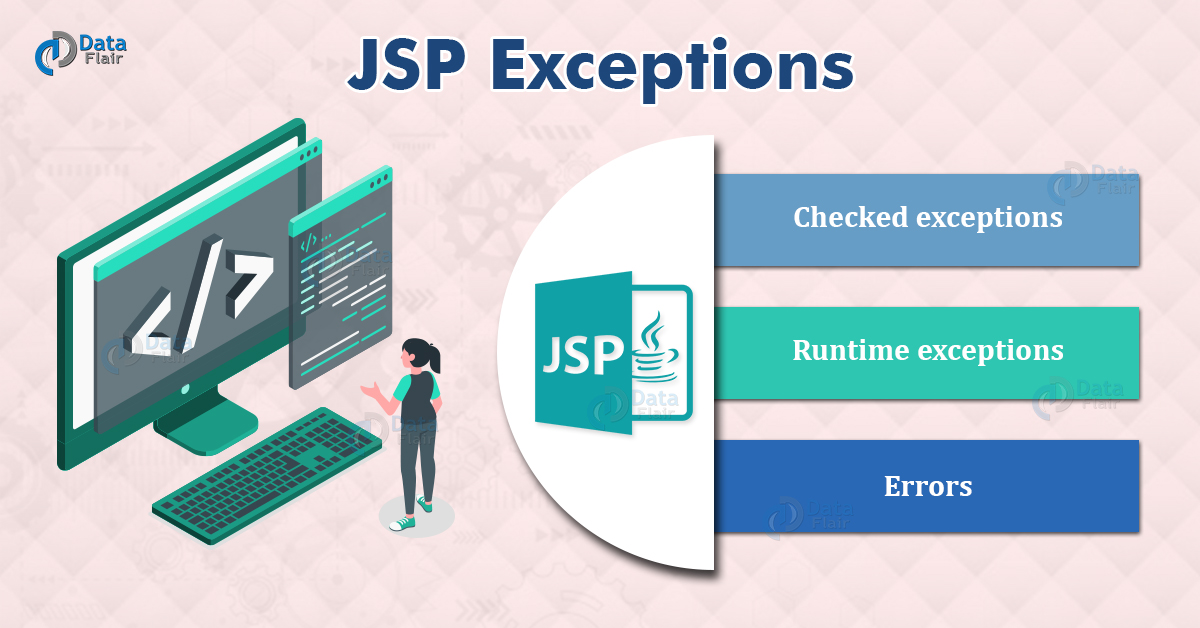JSP Exceptions – Exception Types and Objects
FREE Online Courses: Your Passport to Excellence - Start Now
In this Tutorial, we will learn about JSP Exceptions. To begin with the JSP Exception, we need to know what an Exception is. So let’s start!!
JSP Exceptions
Exception is also referred to as an Exceptional event. Exceptions occur during the execution of programs. Such events disrupt the flow of the program.
When errors occur within methods, the method will generate an exception object. The runtime system gets this object. This object will contain all the information about that error (the type of error, message for the error, state of the program when the error took place). This complete process is also known as throwing an exception.
While coding, we might make mistakes that are known as exceptions in programming. Human beings intend to make mistakes, thus it is important to discuss the errors that can possibly be made.
Exceptions in JSP occur if there is an internal error in the system or if there is an error in the code. Unlike Java, exceptions in JSP are there if there is an error in coding.
Exception handling in JSP is similar as in Java i.e. using try and catch blocks. There are other extra methods as well in JSP to handle exceptions.
Types of JSP Exceptions
JSP Exceptions are of three types:
1. Checked Exceptions in JSP
Exceptions that users make are called checked exceptions. It also includes exceptions that a programmer and developer can’t see. For example, a file that needs to be compiled can’t be found. The compiler can’t ignore these exceptions at the time of compilation. Other examples can be an IO Exception or an SQL Exception.
2. Runtime Exceptions in JSP
Unlike checked exceptions, compilers may avoid these exceptions at the compilation time. This exception might have been avoided by the developer or programmer. Errors like Arithmetic exception, Null Pointer exception, ArrayIndexOutOfBounds exception fall under this category.
3. Errors in JSP
Technology is evolving rapidly!
Stay updated with DataFlair on WhatsApp!!
Errors are also ignored at the time of compilation, but they are out of the reach of the user or programmer. One cannot do anything about it. These include Instantiation error, Internal error, Stack Overflow, etc.
JSP Exception Object
It is an instance of Throwable class and is available just for error pages. The following are the methods available of Throwable class.
1. public String getMessage()
This message will be initialized in a throwable constructor. This method will provide a description of the exception.
2. public Throwable getCause()
This method gives the root cause of the exception.
3. public String toString()
This method will return the class associated with getMessage().
4. public void printStackTrace()
This method gives the stack trace for the system error with the toString() message.
5. public StackTraceElement [] getStackTrace()
This method will return the array of all the elements of stack trace.
6. public Throwable fillInStackTrace()
This method will fill the throwable object with recent stack trace with any previous information.
Conclusion
Inference to this article, we came to know about the different JSP exceptions that might occur while running a JSP page. We learned different methods for Exception objects of Throwable class. Thus it becomes important to learn what mistakes might occur in the future beforehand. Once we learn about the mistakes, we can easily handle them through Exception Handling.
You give me 15 seconds I promise you best tutorials
Please share your happy experience on Google


